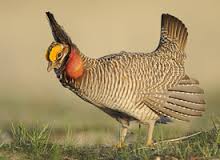 Congressman Frank Lucas today made the following statement after the United States Fish and Wildlife Service announced the Lesser Prairie Chicken (LPC) as threatened under the Endangered Species Act (ESA).
Congressman Frank Lucas today made the following statement after the United States Fish and Wildlife Service announced the Lesser Prairie Chicken (LPC) as threatened under the Endangered Species Act (ESA).
“I was disappointed the Fish and Wildlife Service announced the listing of the Lesser Prairie Chicken as threatened under the Endangered Species Act,” said Congressman Frank Lucas. “I believe the conservation efforts seen in the five-range states were more than sufficient to warrant a non-listing of the LPC. While I understand the importance of conserving the species, this means Oklahoma farmers, ranchers and energy producers will have to abide to an additional layer of burdensome regulations.
“Looking forward, it is my hope the Obama Administration will realize saddling Americans with additional regulatory burdens through arbitrary means is harmful to the economy. The efforts by Oklahomans to conserve the species were and continue to be unprecedented. As the Congressman representing the Third District, I will continue working with stakeholders to preserve the future of the industries important to Oklahoma and the rest of the country.”
Governor Fallin commented on the U.S. Fish and Wildlife Service’s decision to list the Lesser Prairie Chicken as a Threatened Species under the Endangered Species Act (ESA). The governor expressed optimism at the unprecedented option included in the decision that allows landowners and industry to receive protections from harming the species by enrolling in the Western Association of Fish and Wildlife Agencies’ Range Wide Plan and taking steps to allow for conservation:
“While I had asked the Fish and Wildlife Service to not list the Lesser Prairie Chicken under the ESA, due in large part to Oklahoma’s efforts to develop and implement the Range Wide Plan, I believe we have a unique opportunity to show how a plan based in state management of this species can allow for a quick recovery,” said Fallin. “I appreciate the outstanding work of the Oklahoma Department of Wildlife Conservation to develop a new conservation model that keeps states in charge of managing species, like the Lesser Prairie Chicken, rather than the federal government taking over all management control.
“The potential impact of this listing, without the Range Wide Plan, could have resulted in damaging hits to our state’s economy, particularly our energy and agriculture industries. With a large amount of conservation already taking place, my administration will take all steps to continue to implement this plan and work with the Service to de-list this species as soon as possible. I am very excited to see industry and the states continue to work together on conserving this bird with our jointly developed conservation strategies.”
The Range Wide Plan was developed based on the Oklahoma Lesser Prairie Chicken Conservation Plan and the support of stakeholders across the entire range, which covers the entire 40-million acre range of the species across Oklahoma, Colorado, Kansas, New Mexico and Texas. As part of the Fish and Wildlife Service’s listing decision, an exception to the take prohibition was issued to those who enroll and follow the Range Wide Plan. This represents a historic new option for landowners and industry to have available to them. Today, more than 25 percent of the species habitat is under conservation practices that follow the Range Wide Plan.
Enrollment in the Range Wide Plan will continue and allow for enrollees to receive take protection and continue to be managed by the Oklahoma Department of Wildlife Conservation rather than the federal government. For more information on enrollment in the plan, contact Allan Janus at (405) 744-9527. Additional enrollments will allow for a record to be built to facilitate a quicker recovery and delisting of the Lesser Prairie Chicken.
Congressman James Lankford released the following statement:
“This is a prime example of how the Administration inserts itself into the lives of Americans at every possible turn, forcing federal regulations on hardworking Americans and the communities they call home. It is absurd to think that local land and business owners do not care about the quality of the environment in their own backyard and need to be federally controlled. Now that the LPC is listed as threatened, landowners and industry developers in the LPC’s habitat are going to be burdened with the financial hardships and management difficulties that come with federal regulations.
“There is a way to protect species and their habitats in a way that allows for continued economic development and growth without imposing greater regulations in agriculture and energy industries. The five states in the range of the chicken proactively designed a comprehensive conservation strategy and have to date enrolled 11 million acres for conservation purposes—an unprecedented action and accomplishment—undertaken entirely by state and local stakeholders. By listing the LPC, the Administration has shown it does not trust the states to be good stewards of their own land, even when they have clear evidence to the contrary. Historically, the federal government has a deplorable 2% record of recovering species once they have been listed. The State of Oklahoma can and should lead in LPC recovery—not have yet another federal takeover of private land.
“I hope the Administration will see the commitment the five states have to conserving this species, and work with Oklahoma to remove the lesser prairie-chicken from the threatened list. I will continue to perform oversight on the Administration’s broken policies and work to ensure taxpayer dollars are being utilized effectively.”


